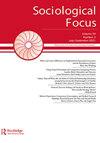Feminist Friends of the Court: Amicus Curiae, Social Movement Institutional Activism, and the U.S. Supreme Court’s Women’s Rights Cases
Q2 Social Sciences
引用次数: 0
Abstract
ABSTRACT To influence outcomes in U.S. women’s rights Supreme Court cases, feminist advocacy groups and their allies routinely file amicus curiae briefs, third-party briefs designed to persuade the justices in their decision-making. Yet no study has systematically examined the impact of these feminist-supporting amici on judicial decision-making. We argue that advocacy groups’ amicus mobilization can be understood as institutional activism, activism utilizing a judicial channel through which advocacy groups can communicate directly with the justices. To discern whether this form of feminist institutional activism shapes judicial law, we examine amicus activity in the women’s rights cases from the mid-1960s until 2016. We utilize a resource mobilization perspective to examine mobilization of amici but offer refinements of the theory by invoking affected-groups and information theories. Our regression analyses show that use of amici can persuade the justices to vote in favor of the feminist litigant. We also investigate whether the influence of feminist amicus activity is moderated by legal circumstances (for instance, whether a justice is conservative or liberal). We find only limited evidence that the potency of this form of institutional resource mobilization is moderated by the legal context.法院的女权主义之友:法庭之友、社会运动机构行动主义和美国最高法院的妇女权利案件
摘要为了影响美国妇女权利最高法院案件的结果,女权主义倡导团体及其盟友定期提交法庭之友案情摘要,即旨在说服法官做出决策的第三方案情摘要。然而,没有任何研究系统地考察这些支持女权主义的“之友”对司法决策的影响。我们认为,倡导团体的法庭之友动员可以被理解为制度激进主义,即利用司法渠道的激进主义。倡导团体可以通过司法渠道与法官直接沟通。为了辨别这种形式的女权主义制度激进主义是否影响了司法法,我们研究了从20世纪60年代中期到2016年妇女权利案件中的法庭之友活动。我们利用资源动员的视角来研究amici的动员,但通过援引受影响群体和信息理论来完善该理论。我们的回归分析表明,使用“之友”可以说服法官投票支持女权主义诉讼当事人。我们还调查了女权主义之友活动的影响是否受到法律环境的调节(例如,法官是保守派还是自由派)。我们发现,只有有限的证据表明,这种形式的机构资源调动的效力受到法律背景的制约。
本文章由计算机程序翻译,如有差异,请以英文原文为准。
求助全文
约1分钟内获得全文
求助全文

 求助内容:
求助内容: 应助结果提醒方式:
应助结果提醒方式:


